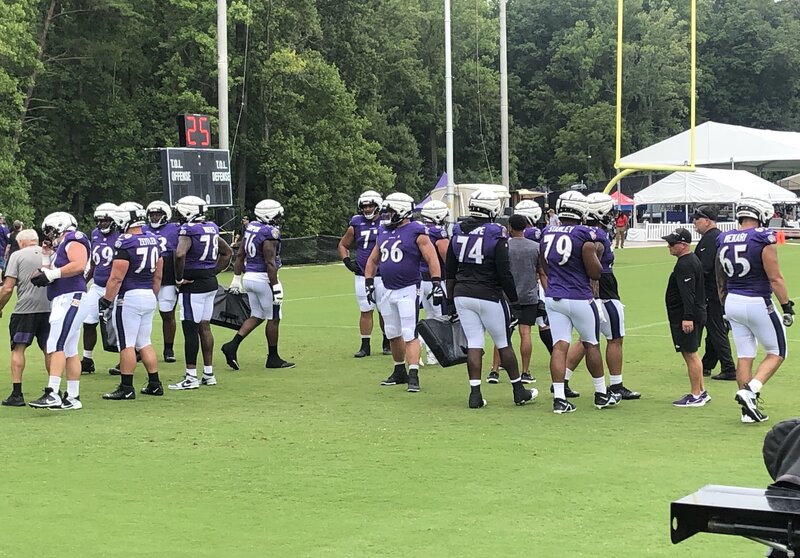In previous years, like after the 2007 home loss to the Colts, Lewis curled up in a fetal position in the training room sobbing uncontrollably. By 2012 he had a calm about him, a resolve. Lewis had an explanation, a meaning he put to it. He had seen seven disappointing postseason exits in his career since hoisting the Lombardi Trophy in 2001 as the Super Bowl XXXV MVP and was instead trying to put it into perspective for the media throng at his locker and to the fans in Baltimore. He reiterated what was later captured on film as his message to his fallen 2011 teammates.
“Is it the toughest loss ever? Absolutely not,” Lewis said. “I’ve been in this business too long. As a team we came out and fought. For the game to come down that way, we knew that. We’re built for 60 minutes, up and down, injury here and there. We fought back in the last seconds of the game. To have an opportunity to win, you can’t ask for anything else.
“God has never made a mistake,” Lewis preached, after telling the story of a 17-year old boy who lost his battle with bone cancer earlier in the week in Baltimore as being what’s really important in life to his teammates in the locker room to console their loss on the field. “Someone is going to feel like this in two weeks. That’s the way the league is. Only one team wins at the end. Whoever wins it — it’s their year! That’s a fact. That’s the irony of sports. There’s a winner and a loser. When you lose you have to suck it up like a man. Say ‘Father, if that’s your will…so be it.’ As a man, you have to keep moving. As a team, keep building, building and remember this taste no matter how many times you go through it. Because when you finally get it, when you feel that confetti, you’ll appreciate it more. I’m gonna take my loss as a man.”
It’s always about the confetti with Ray.
Before he addressed the media, Lewis told his teammates in an emotional locker room just moments after the loss, “It ain’t about one play. We did what we were supposed to do — we fought as a team. There’ll be one team crowned. Someone else will feel it. We have to make sure we finish it next time. That’s all we gotta do. Joe, you played your ass off, you hear me! Let’s understand who we are as men. Let’s make someone smile when we get outta here.”
For Ed Reed, who was still trying to put an exclamation mark on a Hall of Fame career with a Super Bowl berth, he exited the locker room with giant headsets on his ears and refused to speak to the media. He was singing the second verse of the Teddy Pendergrass classic, “Love T.K.O.” almost gospel style.
Harbaugh said the Ravens would rise again in 2012 and that they would rebound and gear up to go to the Super Bowl in New Orleans next year. These postseason losses were all too familiar to him. This was the fourth year in a row of the January disappointments in Baltimore and Harbaugh’s continuing story of making the playoffs nearly every year without a championship ring extended far further than anyone else. With Andy Reid and the Philadelphia Eagles, he had endured playoff exits in six of eight years and five in a row from 2000-2004 including a Super Bowl loss in Jacksonville in 2005. Harbaugh had tasted every part of the postseason fruit and joys of great seasons, but had never touched the Lombardi Trophy.
And suddenly, abruptly, and cruelly, the season was over. But the Ravens were seemingly as close as you can get to going to a Super Bowl without going. That feeling would simmer for an entire spring and summer.
o o o
The morning after the game, several Ravens executives’ phones were buzzing, not with condolences instead with the remnants of the success and reputation that they had started to earn in the NFL. Defensive coordinator Chuck Pagano, who had climbed the ranks of the NFL via college football over 28 years, had gotten a call to interview with the Indianapolis Colts to be their new head coach after Jim Caldwell was fired at season’s end. It was very clear that they had waited on him through the playoffs.
Like Harbaugh, Pagano had grown up in the game knowing no other life than that of a football coach. He followed Butch Davis from the University of Miami to the Cleveland Browns and wound up in Oakland with the Raiders before going back to college football at North Carolina in 2007. He came to the Ravens as the secondary coach in 2008 on Harbaugh’s first staff and became the defensive coordinator when Greg Mattison left to go to Michigan in 2011. Pagano had only called the shots on defense for one season, but he was beloved by his players and developed some deep personal relationships in his four years in Baltimore.
It was a little bit of a shock that Pagano was leaving so abruptly, but such is life in the NFL when all you do is make the playoffs every year. The coordinators who get head coaching jobs are the ones who are on the most successful teams. The Ravens have been paying for success in this way since Billick’s first Super Bowl staff filled head coaching chairs all over the NFL.
With Pagano out, Harbaugh quickly promoted linebackers coach Dean Pees, who had served four seasons as Belichick’s defensive coordinator in New England. Pees, 62, was a generation older and had actually worked alongside Belichick’s father, Steve, at Navy in the late 1980s.
Harbaugh loved having a student of Belichick on his staff and once again was promoting from within to a worthy candidate who had earned the chance to be his defensive coordinator. Keep it in the family, that’s a Harbaugh tradition and it goes back to Schembechler. Keep and promote your best people. Pees was next man up.
“There’s a history of great defense here, and we’re all proud of it and want it to continue,” Harbaugh said. “It was a natural transition to go to Dean [Pees] as our coordinator. We totally trust him. We were fortunate to get him after he left New England and proud that he wanted to be here. The base elements of our defense are there, but schemes change, and it constantly evolves. We have pieces of New England, some Philadelphia, a little from Jacksonville, and on and on. We’re always looking to improve. That’s what the players want, and Dean is excellent at keeping players a part of the planning process.”





























